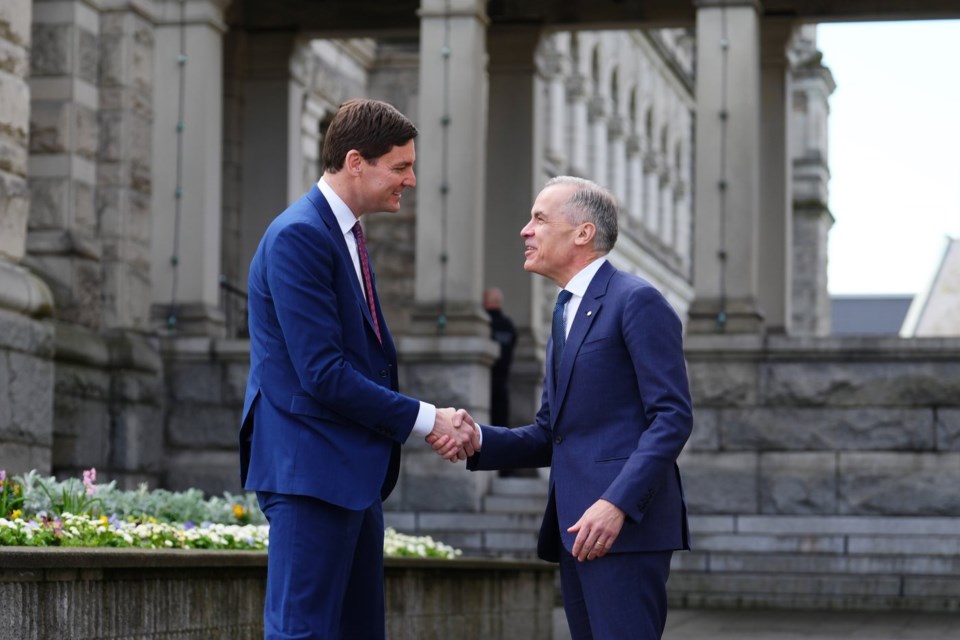British Columbia Premier David Eby said he had a "productive" discussion with Prime Minister Mark Carney on Monday, with a focus on a "Team Canada" approach to what Eby called "attacks" on the softwood lumber industry by the United States.
Eby and Carney spoke about building more housing with mass timber, the premier said in a statement, and the province welcomes the opportunity to meet the growing domestic and international demand for value-added wood products.
Eby said U.S. President Donald Trump's "renewed assault" on the forestry sector needs the same unified response as the manufacturing and automotive industries in Ontario and Quebec, which have been the target of American tariffs.
The meeting comes after the U.S. Department of Commerce announced Friday that it had determined a preliminary combined anti-subsidy and anti-dumping duty rate of 34.45 per cent for Canadian lumber, more than double the current levy.
At their meeting, Eby said Carney "confirmed his understanding of the seriousness of the softwood issue" and his commitment to work with the province to address it.
Eby said the pair also discussed affordable housing, expediting major projects and a national transportation corridor for goods and services.
"No matter the result of the federal election, we need a federal government that is ready to help address bottlenecks in our transportation corridor to get our goods to market, as well as expand training to build a highly skilled workforce," he said.
"Any successful trade diversification strategy for Canada hinges on our success as a province. I feel the prime minister is fully engaged on these critical issues."
Carney, who was on a campaign swing in Victoria, told reporters ahead of the meeting that it was not his first time talking with Eby about softwood lumber and Canada's response to the broader trade dispute with the United States.
"We're going to fight, protect and build," he said.
Asked about the U.S. plan during the earlier news conference in the Victoria area, Carney told reporters "these tariffs are wholly unjustified."
He said he recognized the importance of the industry that supports tens of thousands of workers and the federal government is stepping up on their behalf.
"This is another unjustified tariff. You can expect us to fight against it."
Carney said there is an opportunity to play to B.C.'s strengths in modular housing and mass timber as the federal government looks to speed up homebuilding.
Eby told reporters the American announcement was "bad news," after issuing a statement on Saturday saying the plan was an "attack on workers."
Carney pointed to his Liberals' recent campaign pledge to implement a national housing strategy with the goal of building half a million homes a year, doubling the current rate, and said supporting Canadian lumber is part of that effort.
"We do have that ambition to build in this country, to use our resources."
The BC Lumber Trade Council issued a statement that urged the U.S. Commerce Department to reverse its preliminary decision, saying the higher levies would hurt workers on both sides of the border and drive up lumber prices for Americans.
Council president Kurt Niquidet said B.C. does not subsidize its lumber industry and the U.S. duties are "unjustified and harmful."
Rather, he said B.C.'s system is grounded in market principles, with timber sold through open, competitive auctions.
"Claims that B.C.'s system provides an unfair advantage are simply not supported by the facts. Commerce continues to employ flawed and misleading methodologies, resulting in the higher rates," said the statement issued Sunday.
During question period in the B.C. legislature on Monday, provincial Conservative Opposition Leader John Rustad asked Eby what his "new Liberal puppet master, Mark Carney, has told him to say" about softwood lumber.
Eby said his government stands with the forest industry.
The premier said he recently attended the conference of the Council of Forest Industries in Prince George, where he heard firsthand from members of the industry about their recommendations for responding to Trump's latest "attack."
"Ministry staff are currently working on a proposal to defer stumpage revenue for (the) forest sector, give them some relief. We expanded the vehicles that can be used to move pulp more economically. We are using resources internally to advocate for B.C. wood products internationally, diversify markets."
Eby said the industry has also faced numerous challenges, including the mountain pine beetle outbreak and worsening wildfires.
Rustad said B.C. mills have been shutting down, workers are С����Ƶ laid off and companies are shifting their operations south of the border.
"It's been eight years of NDP failure on the forestry file," he said.
The federal New Democrats, meanwhile, issued statements from several candidates on Vancouver Island, where many people depend on the industry.
"The forest industry is taking a hit. The current softwood lumber tariffs are already devastating — this will be crippling," said Gord Johns in Courtenay-Alberni.
"What we need right now is to build hospitals, bridges and houses — and let's do it using Canadian lumber and steel."
This report by The Canadian Press was first published April 7, 2025.
Brenna Owen, The Canadian Press




